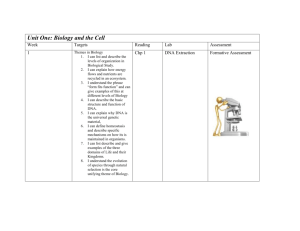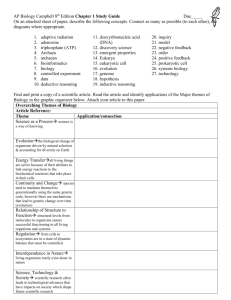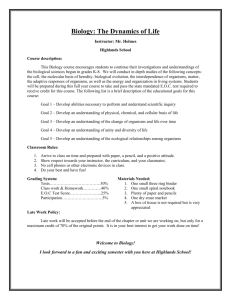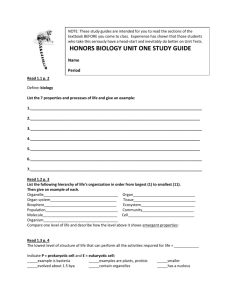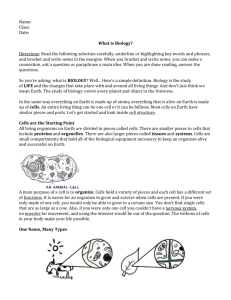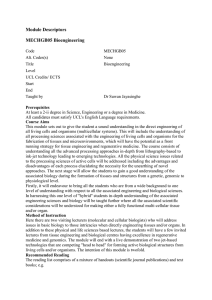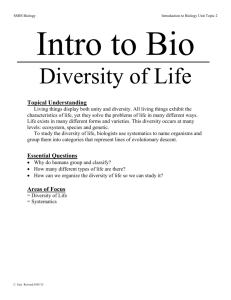Word file - University of Washington
advertisement
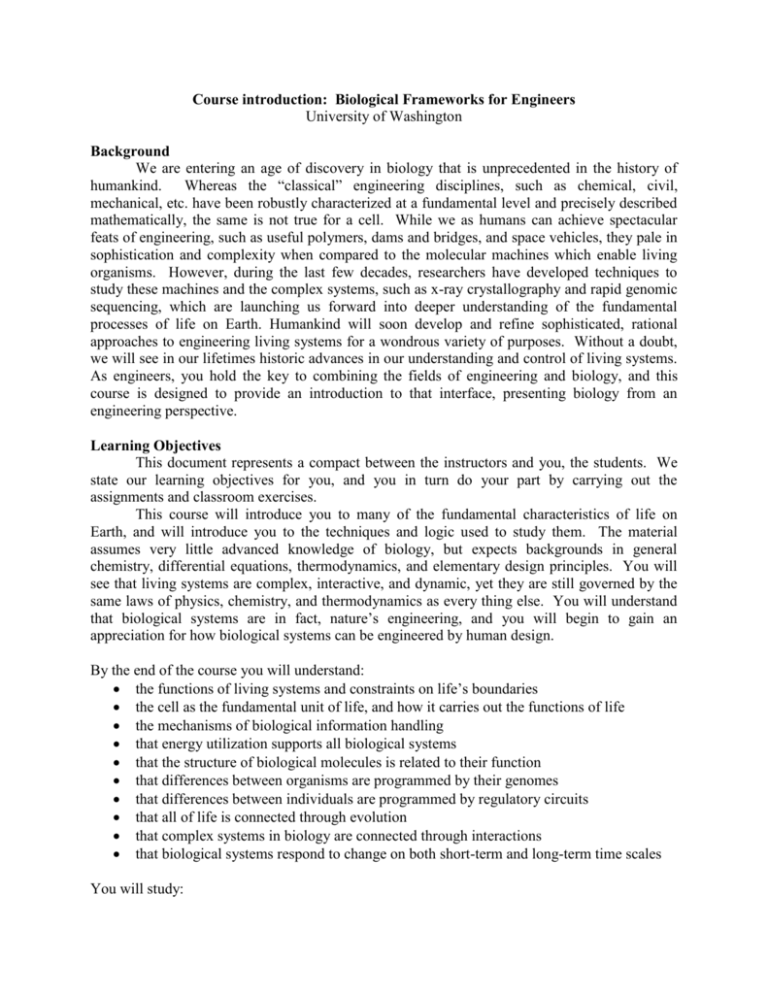
Course introduction: Biological Frameworks for Engineers University of Washington Background We are entering an age of discovery in biology that is unprecedented in the history of humankind. Whereas the “classical” engineering disciplines, such as chemical, civil, mechanical, etc. have been robustly characterized at a fundamental level and precisely described mathematically, the same is not true for a cell. While we as humans can achieve spectacular feats of engineering, such as useful polymers, dams and bridges, and space vehicles, they pale in sophistication and complexity when compared to the molecular machines which enable living organisms. However, during the last few decades, researchers have developed techniques to study these machines and the complex systems, such as x-ray crystallography and rapid genomic sequencing, which are launching us forward into deeper understanding of the fundamental processes of life on Earth. Humankind will soon develop and refine sophisticated, rational approaches to engineering living systems for a wondrous variety of purposes. Without a doubt, we will see in our lifetimes historic advances in our understanding and control of living systems. As engineers, you hold the key to combining the fields of engineering and biology, and this course is designed to provide an introduction to that interface, presenting biology from an engineering perspective. Learning Objectives This document represents a compact between the instructors and you, the students. We state our learning objectives for you, and you in turn do your part by carrying out the assignments and classroom exercises. This course will introduce you to many of the fundamental characteristics of life on Earth, and will introduce you to the techniques and logic used to study them. The material assumes very little advanced knowledge of biology, but expects backgrounds in general chemistry, differential equations, thermodynamics, and elementary design principles. You will see that living systems are complex, interactive, and dynamic, yet they are still governed by the same laws of physics, chemistry, and thermodynamics as every thing else. You will understand that biological systems are in fact, nature’s engineering, and you will begin to gain an appreciation for how biological systems can be engineered by human design. By the end of the course you will understand: the functions of living systems and constraints on life’s boundaries the cell as the fundamental unit of life, and how it carries out the functions of life the mechanisms of biological information handling that energy utilization supports all biological systems that the structure of biological molecules is related to their function that differences between organisms are programmed by their genomes that differences between individuals are programmed by regulatory circuits that all of life is connected through evolution that complex systems in biology are connected through interactions that biological systems respond to change on both short-term and long-term time scales You will study: the structure and function of DNA and protein the mechanisms by which DNA stores, uses, and regulates the information contained in its sequence how that information may change over time – a concept central to life -- and how those changes can be used to distinguish between individuals how organisms can regulate the activity of individual cellular genomes to produce diverse cell types that are organized into complex tissues how these tissues are “engineered” into complex composite materials such as muscle how minor changes in DNA sequence result in devastating diseases in people how the human body responds to exercise and how the internal feedback system works Throughout the course, you should be able to consistently identify and describe the components of the system(s) under study, explain how they work and interact, and apply your new knowledge to an analogous but different system or problem. You will address open-ended problems (those with no single solution), and you will analyze and evaluate complex systems. In addition, you will discuss and evaluate ethical issues associated with the engineering of biology. Finally, you will read and analyze biological research literature papers. The course material will be taught using a combination of lectures, class- and small group discussions, homework and reading assignments, mathematical and numerical modeling problems, and laboratory exercises. This course will provide you with education in the following ABET criteria: (a) an ability to apply knowledge of mathematics, science, and engineering (b) an ability to design and conduct experiments, as well as to analyze and interpret data (c) an ability to design a system, component, or process to meet desired needs (d) an ability to function on multi-disciplinary teams (e) an ability to identify, formulate, and solve engineering problems (f) an understanding of professional and ethical responsibility (g) an ability to communicate effectively (j) a knowledge of contemporary issues
